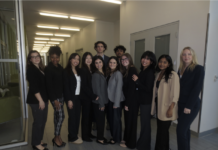The most recent addition to the services offered by Feds is Racial Advocacy for Inclusion, Solidarity, and Equity (RAISE).
RAISE hosted their first conference, Xchanges: the Complexities of Intersections on Mar. 23 in the Quantum-Nano Centre. The conference featured keynote presentations by NDP MPP Dr. Laura Mae Lindo and Robin Mazumder, urban scientist and PhD candidate for cognitive neuroscience.
Dr. Lindo shared her experiences as a black woman in Queen’s Park as she struggles to bring issues of systemic racism to the forefront of the collective political psyche.
“It’s not sufficient to fight just for women because, historically, that only meant we’re fighting for white women. We have to remember to keep fighting because once that bar moves a touch, not all of my intersecting identities are being allowed into the system,” she said. “I’m not a woman in Queen’s Park. I’m a black woman in Queen’s Park, and no one can take that away from me.”
Mazumder described how the built environment focuses on the few and plays a role in marginalizing many different communities. For example, he explained how some places in the world clear snow from the sidewalks and trails before the road so that people whose primary method of transportation is walking are still able to maintain normal activities in periods of heavy snowfall.
He described benches with spikes and gated parks that prevent homeless people from finding shelter in them. Also, he shed light on the very different experiences of women cycling in bike lanes who are sometimes harassed and groped by men in the cars beside them.
“Cities are about space and that space can be governed by a number of different factors … and a part of being in a city is negotiating space,” he said. “Public space is integral to us being a connected society … but I think that public space is under threat.”
Dr. Lindo also agreed with Mazumder’s idea that cities cannot be relied upon to make changes necessary for a more inclusive environment themselves.
“I don’t need more people to put pins on and celebrate my blackness. I celebrate my blackness everyday!” she said. “We shouldn’t be celebrating, we should be acting, we should be doing things. You can’t eliminate anything just by acting.”
Sorry to bother you
Dr. Craig Fortier believes in unapologetic disruption as a key to a more equitable world. He stated that change requires mutual aid between different groups, individual and collective autonomy, and direct action that strive to disrupt the social structure in order to make it better. Dr. Fortier advocated for both resistance and prefiguration. While resistance is well understood as an organized effort to oppose an aspect of society, prefiguration, which is an effort to collectively create the spaces that a group desires through means of fighting current oppressions, is not as common. Both of these processes, according to Dr. Fortier, happen in three planes of reality: within a person, against a norm, and beyond the fight. In the beyond, he stated, the collective imagination and dream are paramount.
Islam and Blackness
Rania El Mugammar, activist, poet, mother, academic, is a Sudanese Muslim woman who is well aware of her intersectional identity. El Mugammar spoke to
Room about the interactions between Islam and blackness, and the racism that is prevalent even in religious organizations. She emphasized that black Muslim women often bear the brunt of islamophobia, racism, and sexism. She stated that they are spoken for, about, and at, but are rarely given the opportunity or the freedom to speak for themselves. El Mugammar also revealed the importance of art and poetry in healing from wounds sustained from merely existing. During her talk, she revealed how black people are at the bottom of the racial hierarchy in the West and in the Middle East, where Arabs sit at the top. Her message to her audience was simple: Liberation does not mean another group replaces the white man in the social hierarchy, it means progress that leaves no one behind.
Kitchen Table
The Land Acknowledgement often becomes a box to be checked rather than a critical aspect of Canadian discussion. During this session Heather George, Emma, and Katie Turriff, representatives from the UW Indigenous Student Centre, held an intimate discussion about the importance and history of land acknowledgements. They explained that treaties were not the fair and equal agreements that many Canadians think them to be – they were signed Indigenous people who held different expectations and who were often threatened or imprisoned until they signed away their rights and lands. Treaties have largely been ignored by settlers, they stated, and lands promised to Indigenous people have been leased out, sold, and used without their permission. Now, most Indigenous people are confined to a small area of land, or are forced to forsake their Indigenous identity to partake in Canadian society.
Raising the Bar
People have the power to make change, but there are barriers to doing that. Here, Lauren Burrows and Humera Javed of the WLU Centre for Diversity discussed the barriers that many student activists doing equity-focused work face and the best practices for for an institution looking to support student leadership through an anti-opressive framework.
Diversity, equity, and inclusion have become currency for institutions in terms of promoting their reputation. Institutions recruiting racialized students by saying that they have supports and then not having those things, is direct exploitation.
Marginalized students are constantly fighting for equitable representation and instituitional change. People have the power to make change, but there are barriers set up inevery system.
Students are drivers of innovation, but cannot be responsible for institutional change, despite being the group that is most impacted by institutional choices. They are transient, and there needs to be an institutional memory that is not lost in the students. It is a broader institutional choice, it has to be implemented top-down.
Agents of Change
Dr. Ciann Wilson discusses the importance of leaving the individualistic mindset that has been instilled in us by the effects of colonialism. ‘‘In our communities, we cannot afford to think individualistically because everyone of us who graduates, it matters. Period. We have entire communities to hold and uplift,’’ Wilson said.
Relationships are integral to research, community work, and development. When you have relationships with people, it builds trust, support networks, buffers against exploitation, and provides accountability. ‘‘You can’t take, exploit, extract and leave or else those ties are cut immediately, so there is more at stake,’’ Wilson said.





























